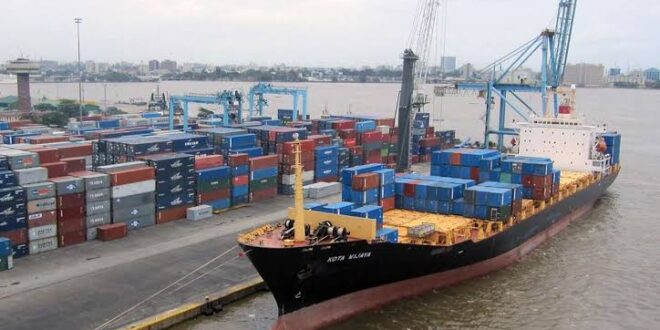Four major Nigerian ports have been engaged in a fierce competition to attract the patronage of large ships, with each port striving to handle the largest container vessels in the region.
This rivalry has spurred significant developments and investments in port infrastructure and equipment, leading to a series of record-breaking events in the Nigerian maritime industry.
West Africa Container Terminal Nigeria (WACT) at Onne port kicked off the competition in 2020 by announcing the berthing of the then-largest container-ship to Nigeria, ‘Maersk Stadelhorn’, with an overall length of 300 meters and the capacity to carry about 10,000 Twenty Equivalent Units (TEUs).
WACT followed this achievement by welcoming the 5,042 TEUs containership ‘Lady Jane’ in 2022, which had a length overall of 294.5 meters.
The Lekki port, a newly commissioned facility, announced the arrival of the 300-meter Length Overall (LOA) vessel ‘CMA CGM Rabelais’, which had a capacity to carry 6,570 TEUs.
This event set a new record for the port and the Lagos Pilotage District.
Tin-Can Island Port Complex responded to these developments by announcing the berthing of ‘MSC Maureen’, a vessel with a 300-meter LOA and the capacity to carry a total of 15,000 TEUs.
This achievement was a testament to the Nigerian Ports Authority’s (NPA) readiness to receive vessels despite infrastructure challenges.
In June 2023, the Lagos Port Complex, Apapa, received the largest container carrier in its history with the ‘Kota Cantik’, a 300m LOA vessel designed to carry up to 6,600 TEUs.
This milestone demonstrated the NPA’s commitment to upgrading port infrastructure and equipment.
Not to be left behind, Ports and Terminal Multiservice Limited (PTML) at Tin-can Island port announced the arrival of the ‘MV Great Lagos’, the largest Container-RORO (CON-RORO) vessel in the world, with a capacity of 2,500 vehicles and 2,000 containers in a voyage.
Despite these achievements, maritime expert Charles Okoroefe has cautioned that the focus on attracting large ships should not overshadow the need to ensure that vessels do not leave the ports empty after discharging their import consignments.
He emphasized the importance of creating additional value for the economy by addressing issues such as cargo evacuation and deployment, as well as improving access routes to the ports and resolving the chaotic traffic in the Lagos area.
As the competition among Nigerian ports continues to intensify, the focus should remain on enhancing the overall efficiency and economic contributions of the maritime industry to the country’s growth and development.
Subscribe to the Advocate News letter and receive news updates daily in your inbox.
 Advocate.ng Latest news update on politics, entertainment, sport and more
Advocate.ng Latest news update on politics, entertainment, sport and more




